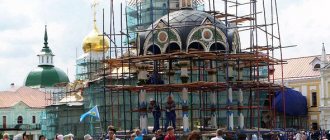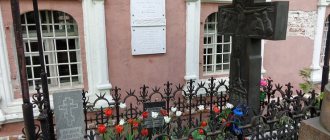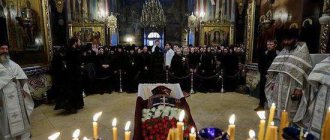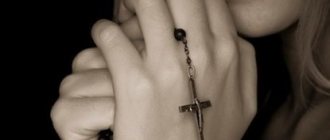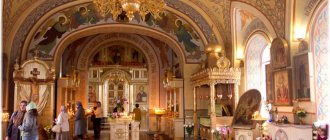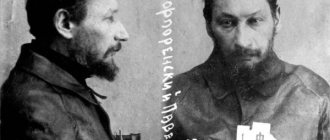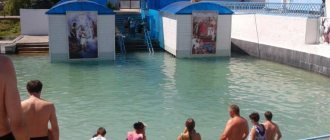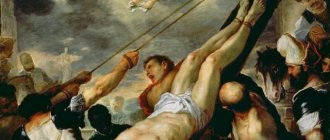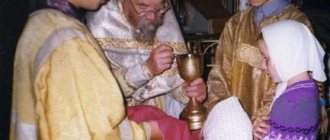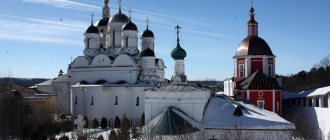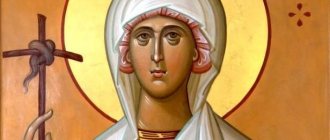Childhood, adolescence, youth
The elder was born in 1850 on September 2. At baptism he was given the name Zechariah in honor of the prophet of God Zechariah, the father of John the Baptist. Zachariah's parents were peasants, former serfs of the Naryshkins, they lived very richly, they were “masters themselves,” as they said at that time. They lived in the Kaluga province. They had 11 children. Zechariah was born eleventh. Many of the brothers and sisters died over time.
Zechariah was born not at home, but in a field. His mother Tatyana Minaevna worked until the last minutes, and before the birth of the child she went into the field to lay flax, she went alone, and her time came, and without outside help she gave birth to a male baby. And it was cold. The mother put her son in the hem, there was nothing to wrap him with, and brought him home. Zachariah's father, Ivan Dmitrievich, was a believer. He often went to church and prayed fervently. He managed the farm skillfully, sometimes selling apples and seeds, but had a big drawback: he drank heavily and scolded his wife when drunk, although he was very kind by nature. He would drink and say to his son: “Zakhar, I’ll bring you some gifts.” “No, you’re drunk,” answers his seven-year-old son, who since childhood has been disgusted by everything bad and ugly. “Oh, you’re a swindler, how can you answer dad like that,” mother Tatyana Minaevna stopped her son. But it must be said that Zechariah’s mother was a holy person. She helped everyone, she loved everyone. She gave bread to the poor in rags, meat, and other food supplies. She did not spare anything for the poor. Yes, in addition, she gave advice. Without her advice they don’t even get married. You need to ask Tatyana Minaevna everything and do as she says. She enjoyed enormous authority and respect among her villagers.
And she raised her son in such a way as to instill in him, most of all, the love of helping all the poor and suffering in any way he could. Sometimes he would play with the children, get hungry, ask for some bread, the mother would give him a big loaf of bread and say: “First feed your friends, and then eat it yourself.” These demands of the pious mother quickly took root in the boy's tender heart.
It used to be that Zechariah’s father, going out to sell seeds and apples, would take his son with him, and as soon as he left, the boy began to sell goods to the poor without money. He himself used to call customers and generously share his goods with them.
The boys loved the meek Zechariah and nicknamed him “priest.” “We will build a church on the field, and you, Zakhar, will be our priest and crown us,” his young friends told him.
The remains of the monastery’s confessor, Schema-Archimandrite Zacharias (1850-1936), were transferred to the Trinity-Sergius Lavra
When after the revolution they began to close the monastery, the elder prayed for everyone and asked St. Sergius to forgive those who violated the commandment of God. He asked for blessings for all the brothers who had gone to private apartments. He asked the monk again, when it pleases the Queen of Heaven, to open his monastery so that many monks could be saved in it. He recalled a vision to St. Sergius, who once saw many birds, and it was revealed to him that his disciples would multiply so much that it would be difficult to count them.
Finally, his time came, and Elder Zosima was the last to leave the Trinity Lavra.
He moved to Moscow, to the Serbian courtyard, to his spiritual son, Father Seraphim V. At this time, E. G. P. was visiting Father Seraphim. Having learned that the elder had nowhere to live, she invited him to her place, and Elder Zosima moved to Tverskaya. In the courtyard of the house, the Savvinsky courtyard was not yet closed, and the elder sometimes served there.
After some time, the people felt the grace living in Elder Zosima, and many people began to come to his cell. People were always crowded in the church near Elder Zosima.
God revealed to the elder the life of every person. For some people he predicted their imminent death, while for others, like a tender, caring mother, without saying anything, he prepared them for the transition to eternity. More than once the elder said: “Sometimes I say something completely unexpected for myself, at which I myself am sometimes amazed.”
To the girl who was brought by an old relative, the elder said: “Tomorrow you will partake of the Holy Mysteries of Christ, and I will confess you. Now go and wash the stairs for me, it’s true, it’s almost clean, but I’m saying this for you, and at every step remember your sins and repent. And when you wipe, remember all the journeys of souls through ordeals.”
When the girl went to wash the stairs, her relative asked in surprise: “Why should she take communion tomorrow, it’s not fasting, she didn’t prepare, her health is blooming, she’ll fast afterwards.”
“Tomorrow you will understand why she can’t put off communion. After early mass, come to me yourself, then we’ll talk,” answered Father Zosima.
When the girl washed the ladder, the elder confessed to her for her whole life, absolved her of her sins and looked at her comfortingly, with fatherly love. Having given the guests tea, the elder said goodbye to them.
The next day the girl took communion, felt great and came home joyful. Her relative baked pies and went to put on the samovar. And the girl sat down on a chair and seemed to fall asleep. The Lord took her soul painlessly, instantly. Struck by her death, the old woman ran to Elder Zosima and found him praying for the newly deceased. He consoled the old woman: “Well, what are you talking about, I knew that the Lord would take her, that’s why I blessed her to quickly receive communion.”
One day, when the elder was serving in church, some lady who did not know him came to the service. Seeing Father Zosima, who turned out to be very thin, the lady thought: “Well, what a monk, how can he attract people to the church, he will drive everyone away.” Suddenly the elder, instead of allowing him to enter the altar, began to make his way through the crowd straight to this lady and said to her: “Olga, don’t be afraid, I won’t disperse anyone.” The amazed lady, whose name was really Olga, fell at her feet, asking him for forgiveness for her thoughts, and then always came to the elder for advice.
One nun, sitting at the table with the priest, thought: “If I were a scientist, things would be completely different, I would please the Lord sooner than now, when I am so illiterate.” The elder looked at her and said: “God does not need scientists, He only needs love.”
To one servant of God, who had nowhere to rest, neither with friends nor with relatives, the elder said: “Don’t worry, every bush will let you spend the night.” And, to my surprise, people I didn’t know well began to beg her to come to their village for vacation.
One day the elder was sitting with his spiritual children at the table and treating them to dinner, suddenly he quickly stood up and said: “This is how my Pelagia, as she repents, as she asks me to forgive her sins, even cries; wait, children, leave the meal, pray with me.”
The elder went to the corner with the icons, read a prayer of permission and blessed the repentant spiritual daughter. “Where is she repenting now, father?” “Yes, she’s in the North now. So I’ll ask her, when she arrives, about her repentance. Remember the present day and hour.” And indeed, six months later Pelagia came to her homeland, told the elder how deeply she repented and cried and asked the elder to absolve her at exactly the hour and day on which the elder absolved her of her sins.
There was also a case with two ladies. They went to the elder’s cell, and one of them repented of her sins all the way: “Lord, how sinful I am, I did something wrong, I condemned someone, forgive me, Lord...” And her heart and the mind seemed to fall at the feet of the Lord. “Forgive me, Lord, and give me strength not to insult You like this again. Forgive me, Lord."
The other walked calmly towards the elder. Deciding that she would confess in the elder’s cell, the lady on the way thought about what material to buy for her daughter’s dress and what style to choose.
Both of them entered the cell of Elder Zosima together. Addressing the first one, the elder said: “Get on your knees, I will now forgive you your sins.” - “Why, father, but I didn’t tell you...” - “No need to tell you, you told them to the Lord all the time, you repented to Him all the way, and I heard everything, so now I will allow you, and tomorrow I will bless you to take communion.” .
“And you,” he turned to another lady after a while, “you go buy fabric for your daughter’s dress, choose a style, sew what you have in mind. And when your soul comes to repentance, come to confession. And now I won’t confess to you.”
Two students decided to find out all the perplexing questions of life. They wrote down a wide variety of questions: social, aesthetic, philosophical, family, and simply psychological difficulties. One student had almost forty such questions, and another had fifteen. When they came to the elder, he had a lot of people, and he asked them to wait. The students wait and wait. Now, I don’t have the patience to wait any longer. Suddenly the elder looked at them: “What, are you in a hurry? Well, you first, Lyubov, take out your forty questions, take a pencil and write.” - “I’ll read them to you now, father.” - “You don’t need to read, just write the answers.” And the elder gave answers to all forty questions, without missing a single one, and all the answers were comprehensive.
“Well, now, Elizabeth, take out your fifteen perplexities.” And again, without reading, without asking what they wanted to know from him, he gave answers in the order in which the questions were written.
All their lives these two students were deeply devoted to the elder. One of them died at the age of forty from consumption and on her deathbed she saw an old man who came to her and blessed her. The living one was standing by the bed. And when she was in exile, the elder appeared to her in a dream, performing tonsure on her, and named her Anastasia, although her life turned out in such a way that it was difficult to even think about tonsure.
Catherine Visconti, the elder’s spiritual daughter, said: “I was not Orthodox, but I believed in God. Living in Moscow, I went to Orthodox churches. And then one day, while in grief, I talked with a priest I knew from the Church of St. Nicholas the Bell, Father Alexander. I talked, and he invited me to meet one great elder, whose name is Zosima (in schema Zechariah), a monk from the Trinity St. Sergius Lavra, now an archimandrite. I had no desire to get to know him, I was not Orthodox, as I already said, a believer, but not deep into the faith and had no idea about confessional differences.
At this time, great grief happened to one of my friends, a religious and extremely good person. I felt very sorry for her. I didn’t rely on my prayers and decided: well, I’ll go to the elder whom Father Alexander advised me to help her, since he is so great.
I'm coming. I was let into a large room, where I first saw this marvelous old man, dressed in a white robe. Without asking for any blessing, I said: “Hello,” but he didn’t answer me. Then in a trembling voice I say: “Father, forgive me for disturbing you. I have a friend who is in great tribulation. Pray for her." And I myself make my way to the chair to sit down, and the old man on the other side of the table approached his chair. Again there was no answer. This confused me, and in a trembling voice I began to explain how good she was (my friend), how kind, how unhappy. Finally, my nerves could not stand it, I fell on a chair and sobbed. And then for the first time I heard his voice: “Why are you covering other people’s roofs when your own is open?”
To which I replied: “I have a roof, I’m not without a room.” - “No, you don’t have a roof.” Why do you have the image of St. Nicholas and the Lady Mother of God, when you are supposed to have only one crucifix? “I was internally surprised how he knew everything when he had never been to me.
“Father, I love them very much and I always fall to Saint Nicholas the Wonderworker when I have some kind of grief, or grief, or just sadness.”
“Oh, do you love them? Well, please tell me, now I’ll pray for you, but if you die, who will take out a piece for you? “Do you have a cross on you?” – “Yes.” - “But who put it on you?” - “Sama.” - Father grinned and repeated my answer: “Itself...”
Then the priest turned to the icons and raised his hand. I was surprised by the change in his face. It became somehow unearthly, Divine. And he said quietly, pointing his hand at the icons: “And if something happened, I would beg for the one you’re asking for.”
After that, I stood up, bowed and said: “All the best to you, father,” and left.
Arriving home, I went up to my goddess and said with deep sadness: “This is what I’ve come to, I’ve fallen behind on one bank and haven’t reached the other.” I was overcome by extraordinary anxiety and trepidation, I could not find a place for myself. The elder’s words: “What if something…” were all in my ears. I ran to the priest who directed me to the elder. She came to him with the words: “Father, I can’t stand it any longer, I want to convert to Orthodoxy,” and told him about her visit to the elder.
On the eve of converting to Orthodoxy, I decided to find the elder and take his blessing. Not finding him at home, I went to the people with whom he was visiting. I found the old man sitting in a small room. He greeted me unusually warmly.
“Father, I came to ask for your blessing to accept Orthodoxy.” “I’m very, very glad,” was the priest’s answer, “just now I was scolding the demon possessed, the demon screamed so loudly and went into the closet.” And the elder began to fiddle with his ear, saying: “I almost became deaf, talking with demons.” I asked them: “Can you see the cross?” - “No, we can’t, it’s burning us.”
When the elder reprimanded the possessed, the demons shouted: “Elder Zosima is torturing us by reading incantatory prayers.”
The elder freed many demoniacs from the spirits that tormented them.
After the conversation, I stood up, took the blessing, and headed to the front.
Father came up to me and took my head with both hands. Suddenly I saw thin golden rays emanating from his temples on his forehead, like brightly glowing filaments of the sun. I was amazed, and at the same time my heart felt surprisingly light. Even walking down the street, I thought: are there evil people in the world? It seemed to me that everyone was filled with the same joy as me. I felt the grace given to me by the elder. I myself have never felt such unearthly joy, peace and tranquility. It was the mercy of God that I received thanks to the prayers of the elder.
On the third day after accepting Orthodoxy, I came to the elder. She knocked on the door. He himself opened it to me with an exclamation: “Ah, Catherine, show me your Orthodoxy.” - “Father, I don’t know how to show my Orthodoxy, I accepted it.” - “Well, show me your Orthodoxy.” - “Honestly, I don’t know what to do.” When for the third time he urgently told me: “So show your Orthodoxy,” then my gaze fell on his goddess and I crossed myself. - “Well, now you are my sister, we have only one Mother.” He came up, kissed me on the forehead and invited me to drink tea. Taking a saucepan full of milk from the window, he poured all the cream into my glass, so that the saucer was also filled. Approaching the buffet, he took three or four pounds of black bread and a large handful of sugar, about half a pound, and put it all next to my glass. Then I told him: “Father, what are you doing? I can’t eat all this.” Without answering me anything, he came up and blessed everything with the words: “Yours from Yours, what is brought to You.”
“Do you need bread?” was the question. - “I need it.” Having cut off a large slice of bread, the priest blessed it and said: “Here is my blessing for you, so that you never need bread in your life.” Do you have a white one?” - “No, father.” Then he gave me a piece of white bread with the words: “Let you have white bread too.” And so, for the prayers of the elder, a friend living abroad, for whom I worked before, remembered me and sent me three parcels in a row from Riga. Each parcel consisted of 20 kg of white flour, 8 kg of sugar, 7 kg of rice, 20 cans of sweetened condensed milk, 2 kg of tea and 4 kg of cocoa. I didn’t write anything to her, but because of the elder’s prayers, she remembered me and sent me such wonderful, rich parcels.
Before receiving these parcels, I had another incident: I was homeless at that time, and there was famine during those years. I was walking to the elder, and I met a beggar. After much hesitation, I gave him the last two kopecks. When I entered the elder’s cell, asking for his blessing, he immediately called me to his table: “Come here, come here,” and pulled out the drawer of his table, where he had money, saying: “Take as much as you need, take it, don’t be shy."
Shortly before his death, Father Zosima went on a pilgrimage to Sarov. One day he approached the saint’s spring, into which visitors were immersing themselves for healing. He came up and didn’t dare to enter the water. Finally, he sighed and said: “Father Seraphim, you know how old, weak, sick, dead I am, I can’t stand cold water, and when I take a bath, I’ll get sick and won’t get home. Help me, warm the water."
And when the elder entered the source, the water became very warm, almost hot. The elder recalled this with great gratitude.
Despite his serious illnesses, Father Zosima was always cheerful and thanked God for everything. He taught us to especially beware of despondency. Dejection is the threshold of hell; it kills the will, feelings and mind.
The elder often told us these words: “What I find you in, that’s what I judge.” He told us this so that we would never forget the hour of death, for at any moment we can be called to eternity and therefore must always prepare for this.
The elder really did not like verbosity and repeatedly told us: “In paradise there are many repentant sinners, but there is not a single one who is talkative.”
Elder Zosima had deep prayerful communication with Metropolitan Tryphon (Turkestanov).
When the elder fell ill, Metropolitan Tryphon visited him, and then asked all those praying in the church to offer a prayer for the elder: “Brothers and sisters, I ask you, pray for the sick elder Zosima. Not everyone here knows him, but I'll tell you who he is. In my youth, I served in St. Petersburg in the rank of archimandrite and was in such a terrible state that I wanted to remove my rank and start a completely different life, but I was offered to meet one novice from the Trinity-Sergius Lavra, who came to St. Petersburg for a collection, that this was not ordinary person. They said he would be of some interest to you. I expressed my desire to meet. And so, after spending the night talking with him, the next morning my thoughts and feelings became completely different. And, thanks to this elder, you see before you the old, decrepit Metropolitan Tryphon.”
After this, all the people fell to their knees and the Metropolitan served a prayer service for the health of the seriously ill elder Zosima (in the schema of Zechariah).
This cathedral prayer service performed a miracle. A few days later the old man felt better: he began to recover. When they told him about the prayer service held for him in the Church of the Great Ascension, Father Zacharias, smiling slightly, said: “Yes, I heard it, I heard it - that eccentric cinder Tryphon.” The elder called Lord Tryphon “Cinder” because he knew that his earthly life would soon, soon end.
When the bishop fell mortally ill, the elder prayed for him with touching love. And when the bishop passed away, the elder’s prayers for him intensified, and the elder ordered all his spiritual children to remember the bishop and all his deceased spiritual children and relatives.
The bishop was buried at the German Cemetery.
“My friend Lord Tryphon wanted me to live another two years after his death. Well, it will be so according to his holy prayers,” said the elder.
And the old man remained on earth for another two years.
Completely weakened, completely immersed in prayer, he continued to direct the souls of people to the Lord, leading them to repentance, which, for his holy prayers, reborn them.
In recent months, the elder was lying down almost all the time. He rarely spoke, and if he said something, it would only be for the benefit of souls.
The elder’s illness was so terrible that another would simply scream in pain and complain incessantly, but elder Zechariah endured in silence, giving thanks to God for everything He sent.
He treated those who came to him with such maternal attention and love, as if his suffering body did not exist. His soul embraced with Divine love everyone who turned to him, completely forgetting about himself.
“Of the affairs on earth, there is nothing more important than prayer. Prayer gives birth to other virtues. I could tell you a lot, but I don’t have the strength anymore,” were some of the elder’s last words. When one of the disciples began to cry, the elder immediately, in a barely audible voice (apparently, it was difficult for him to speak), told us to console us:
“My children, after death I will be much more alive than now, so do not grieve after my death, be afraid of excessive sadness, it can bring you closer to despondency. Just remember firmly that your efforts to acquire the Holy Spirit, your love for the Savior, the Lord Jesus Christ, and your efforts to fulfill all His commandments, your reverent, reverent admiration before God the Father in fear and greatest humility, will fill my whole heart with joy, because I is your spiritual father. I bless you to try with all your might to achieve this.”
The elder silently blessed the disciples and closed his eyes.”
The elder died in full consciousness on June 2/15, 1936, at about 10 am.
“The Jesus Prayer was his main activity”
Matthew, Bishop of Shuisky and Teikovsky:
It’s hard to talk about such people... This is a great man. The seeds that he sowed in the all-Russian church field will still bear fruit, which we will see.
He penetrated into the past with his gaze, and into the future - like a prophet. What he said came true. Knew what every soul had gone through; could expose if a person had unrepentant sins. But I tried to guide him in such a way that in the future he could protect himself from the machinations of the enemy. Many miracles happened.
Father Naum himself was a very strict monk. It has never happened that he missed a rule without any good reason; he came to the fraternal prayer service when he was sick. Always attended the midnight office. At this time, you could take his blessing and ask him something.
He instructed the monastics, as well as the laity, in the Jesus Prayer. He himself lived by prayer and worked for the revival of intelligent work, which was being ruined in our country under the godless Soviet regime. Wrote a Ph.D. dissertation on this topic. He practiced smart work and inspired others to strive: “Before,” Father Naum was sometimes perplexed, “five hundred was the elementary work of monastics. Why aren’t we adopting it now?” He blessed everyone differently: some a hundred, some a thousand. Taught proper breathing when praying. Each one was approached individually. Prayer is a secret activity; there can be no general advice here.
It is said about the apostles: cloven tongues as of fire appeared to them...
(Acts 2:2–3).
Saint John the Baptist indicated that the Son of God would baptize with the Holy Spirit and fire
(Luke 3:16).
And how I wish the fire would already ignite!
(Luke 12:49), says the Lord. This fiery breath was felt in Father Naum.
I happened to be obedient to him as a clerk. I saw that the letter had not even been opened yet, but the priest already knew its contents and the answer that should be sent to the return address indicated on the envelope. His insight was amazing, as was the depth of the short answers he gave. It never sprayed. I looked at the root. After all, you can justify everything eloquently, but the essence will go away. Father Naum always answered briefly and to the point. One or two words from him were enough to understand what to do.
Father Naum always confessed very deeply. The main thing, as it followed from his spiritual practice and from the experience of confession with him, was to achieve contrition, genuine repentance. When confession is superficial, perhaps it is necessary to pay attention to those sins that will allow a person to feel contrition. Father Naum knew how to do this. He could expose any highly intelligent scientist. Valery Yakovlevich Savrey, a professor at Moscow State University and the Moscow Theological Academy, once brought five academicians to him: a mathematician, a philologist and someone else. And Father Naum asked each one a question from his area of knowledge that they were unable to answer. Thus he could convert even the most self-confident to God. A person will humble himself a little, understand the limitations of his mind, and his heart will open to the truths of the Gospel.
The elder cared about the revival of life in the monasteries according to the patristic statutes. He blessed the publication of the charter of Pachomius the Great and distributed it to us for study and development. Father published a lot of sermons and works, at least for his children. He always supplied us with a huge amount of patristic literature. We read all this with his blessing.
Father loved many saints very much. For example, St. Ambrose of Optina. He asked us to make a selection from his instructions - I remember, and I did this. Father Naum somehow intimately experienced the life of this saint: he absorbed this existence dissolved by grace and tried to instill in us a taste for such a life. Through the perception of Father Naum, we somehow vividly perceived the patristic experience and tried to imitate the Holy Fathers in some ways. Father called St. Ambrose of Optina a prophet of the 19th century. And Father Naum himself was for us a prophet of our times.
Imitator of St. Sergius
Abbess Olympias (Baranova), abbess of the Pokrovsky Khotkovo stauropegial convent:
The kindest, the most holy - what else can I say about Father Naum?! He had his own approach to each person. Father instructed the monastics to pray tirelessly and not to forget the Jesus Prayer - this is the most important thing. And all the things of this life will be added (Matthew 6:33), he reminded us. Your Father knows what you need before you ask Him.
(Matt. 6:8). He himself was a very worthy monk, without exaggeration, to say - an imitator of St. Sergius. Our monastery, where the relics of the parents of the Hegumen of the Russian Land rest, the priest helped and helps with prayers, and incessantly.
“For such great elders, only the Judgment of God can determine their spiritual efficiency”
Archimandrite Zacharias (Shkurikhin), monk of the Holy Trinity Sergius Lavra:
We lived next to Father Naum, our cells were on the same floor. Sometimes they crossed paths at meals. He was strict. I made comments. Sometimes you say something wrong or there’s something wrong with your appearance – I’ve seen it all. But he always spoke to the point.
There is close communication between the brethren in the monastery. You can always see whether a person is praying or just like that, “the raven is counting.” Father Naum prayed. He, of course, devoted a lot of time to receiving people. But during the service he tried to concentrate, intensely delving into the words of the service. About synodics, when he was once asked why he didn’t read them, he said: “Let young people read them, so that they have fewer thoughts.”
For such great elders, only the Judgment of God can determine their spiritual efficiency. Now it is very difficult to care for people in our modern world. Vladyka Theognost of Sergiev Posad, our vicar, was always very surprised how Father Naum could remember everyone: who was where in the dioceses, in which remote monasteries, in which small towns and in abandoned villages, and at the same time who had what sorrows, problems, internal temptations. I sent something to someone, passed it on through someone... I received letters, wrote replies.
I remember once some servants of God came to him - they had a lot of problems, they had nowhere to live... He immediately blessed them: “Go there. That’s right,” he calls someone over, “people are going there.” The house is now empty. That’s where you’ll live.” The homeless went there; They were immediately settled and lived there for several years. Then they are told: “That’s it, move out.” They, of course, felt sorry to leave what they had acquired over the years, but they left it all for the next residents. And somehow their lives got on better. Everything through his prayer happened smoothly and naturally. It was the same for the monastics - all problems, both internal and purely everyday, were resolved with the blessing of Father Naum.
Father loved monks very much
Hieromonk Nikolai (Elachev), dean of the Nikolo-Shartomsky monastery of the Shuya diocese of the Ivanovo Metropolis:
Father will forever remain in our hearts. In the Nikolo-Shartomsky monastery, all the brethren were gathered by him. He pulled many of us out of the very abyss of the world and set us on the path to salvation. All of us, with his blessing and his prayers, came to the monastery to serve the Lord and are now grateful to him for this.
How many of his children have already been consecrated bishops and metropolitans! How many hegumens, abbesses, good priests he gave to the flock of Christ, monks and nuns he raised for our holy Church.
The priest had his own method of converting people to monasticism. He will bless you, a man who has previously played tricks in life, to restore the temple: while you are working on the ruins, you will pass such a test! The enemy will beat you up so much that you yourself will understand what is important in life. Asceticism became an urgent necessity instead of an abstract activity. Before coming to the monastery, our brethren revived many churches in Novosibirsk, Priazovsk and other cities.
Years passed before Father Naum gave his blessing for monasticism. Only to him, as an elder, was it revealed where this or that soul was inclined. He could immediately tell someone that his path was monasticism, another after 3 years, and a third after 5 years. Each individual – when a person becomes ready for this.
Father was pleased with our obedience to God, the Gospel, and what the Lord revealed to us through the elder. And our sins upset him. It happened that if we began to act willfully, we would immediately get into trouble and return to him: “What should we do now?..” Father Naum accepted in a fatherly way and did not drive out the repentant.
He could expose your most secret sin - even sometimes somehow imperceptibly, through someone, but everything was revealed to you and you began to understand what you needed to repent of. We all have our weaknesses. But the elder knew who could bear what kind of instruction: he could give someone a thrashing in front of everyone, but not out of passion, but for admonition; and quietly brought someone to their senses in private.
Father loved the monks very much. He was all inspired when someone came to him for a blessing to become a monk. Even if just a person was going to go to the monastery to work, to live at the monastery, the elder was already rejoicing.
Father Naum always instructed: “Read the Gospel - everything is written there.” For us, he is an elder: we know that he did not speak to us on his own, but revealed the will of God.
Recorded by Olga Orlova
December 18, 2017
“We were all under his prayer as if under cover”
Abbess Elena (Bogdan), abbess of the Holy Resurrection Convent of the city of Murom, Murom diocese of the Vladimir Metropolis:
This is a man of God. Holy life. His mother, schema-nun Sergia, was a very pious woman. They lived near Novosibirsk. Her children all died in infancy. When on St. Nicholas Day 90 years ago she gave birth to another boy - also weak - she prayed: “Lord and Mother of God, leave him to me, let him be like St. Nicholas.” Her maternal prayer was heard. The baby was christened with the name Nikolai. He devoted his entire life, like Saint Nicholas, to serving God and people - this is the most important thing.
He was an exceptional monk for our time. He labored according to the ancient monastic rules. He himself was a worker of obedience and taught us in self-denial. Obedience is paramount.
He helped us a lot with his prayer. When the monastics were tempted, the Lord allowed them to sin; Father Naum begged even those severely wounded by sin. Somehow everything was managed invisibly, souls were healed. All of us were under his prayer as if under cover - we could feel it. I think that even now the Lord will give him such a blessed state to help everyone who will resort to him.
